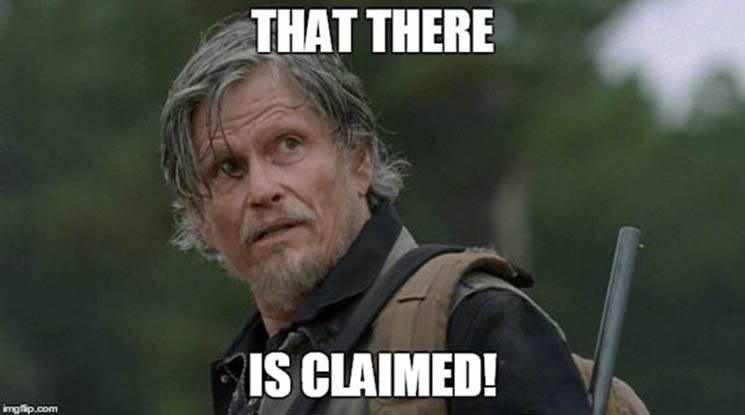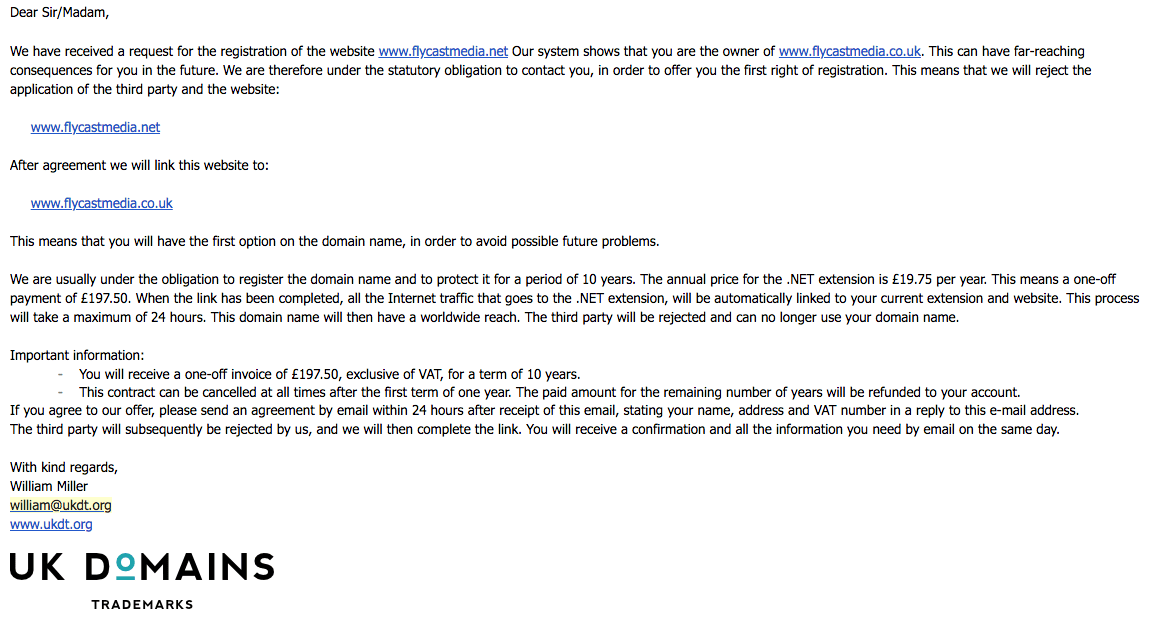HOW TO SPOT DOMAIN NAME SCAMS AND PROTECT YOUR BUSINESS FROM DRIVE BY DOMAIN SQUATTING
Internet Business Scams To Avoid
Cybersquatting is a growing problem and one that is of particular concern to those in the financial industry. there are literally hundreds of stories of domain spoofing costing millions of pounds. In this article, we'll explain what cybersquatting is, how to spot it, and how to protect yourself and your business from it. Even though we are experienced, scammers still try with us too.
Have you received this domain name ‘trademark agency’ email?
Recently I’ve received two separate emails from a company claiming to be a “Domain name trademark agency” … both informing me that my domain name had been “claimed”.

A number of our clients have also received these and you can see the full screenshot of the email in question at the bottom of this message. A lot of the points listed sound very suspicious.
The first line of their email states:
“We have received a request for the registration of the website www.flycastmedia.net Our system shows that you are the owner of www.flycastmedia.co.uk.”
Then they add scare tactics:
“This can have far-reaching consequences for you in the future. We are therefore under the statutory obligation to contact you, in order to offer you the first right of registration.”
They also say:
“We are usually under the obligation to register the domain name and to protect it for a period of 10 years.”
At this point the whole thing becomes laughable, If somebody wants to buy and register any available domain name they can do so without being “obligated” to inform anybody.

Show me the money - £200 for a "link".
So then comes the crux of the matter, they go request £200 to have the new domain “linked” to our existing name.
“The annual price for the .NET extension is £19.75 per year. This means a one-off payment of £197.50. When the link has been completed, all the Internet traffic that goes to the .NET extension, will be automatically linked to your current extension and website.”
Still Available for £9.99 at Godaddy
Seems extremely suspicious since, at the time of writing, the domain name in question is still available for £9.99 from Godaddy

Don’t believe everything you read.
The point we’re making here is don’t believe everything you read, even if it looks pretty official (as this does). As we all know dummy websites are really easy to make, and scammers are everywhere. Scroll down to see the full email.
Domain Name Scams To Avoid
If you have ever received an email or phone call that suggests you act urgently to purchase or re-register a domain name, you have almost certainly been the target of a domain name scam. This type of internet trade mark scam acts on people’s fears (regarding domain squatting) i.e. using a domain name to cause damage to or profit from another’s goodwill and brand identity, and can be initially very worrying.
We explain in detail how to spot domain name scams and protect yourself from drive by domain squatting.

What Is A Domain Name Scam?
- Domain name scams rely on fear
Domain squatting is about using a domain name with bad intent. Somebody else using a domain name very similar to yours obviously has the potential to cause customer confusion and be very damaging to your brand. Companies are, quite rightly, concerned about the possibility of this happening and internet trade mark scams such as domain notice scams play on this concern by indicating (falsely) that a domain name is in some way under threat.
- Are there any examples of well-known domain name disputes?
Bigger companies with high stake brand identities are very keen to protect their good name from domain squatting. For example, in 2012, fashion house Gucci was insistent about its right to control the domain name guccishoponline.org and tech giant Apple were equally active concerning their dispute over the iphone5.com domain name. During 2018, domain name disputes over terms relating to Bitcoin have been rife.
Phishing comes in all shapes and sizes but, in the case of a domain notice scam, the phishing is the process of trying to get people to give out payment details and pay over the odds for domain names that are very similar to their own (or sometimes that they own already).
- Domain trade mark scams come in different forms
Whilst domain notice scams usually come in the form of an email, scammers may also use phone calls to make first contact. There are several types of these scams.
- Domain scams that encourage you to switch from your current domain registrar to their own by pretending that you will be renewing your domain subscription.
- Domain name scams that offer to sell you domain names close to your own. They will present this in the form of a warning but it is an attempt to get you to buy at over inflated prices.
- Domain trade mark scams that claim another company has registered your domain name. They may do this by claiming your domain name registration has expired.
- Domain name scams that claim you are required to register your domain name for a specific amount of time. This is not true and a quality domain name registrar will offer you a variety of options.

How Can I Tell That An Email Is A Domain Trade Mark Scam?
- Make sure you know who your domain name provider is
Be suspicious if anyone other than your current domain name registrar contacts you with an offer to buy or a warning about a domain name or one very much like yours. You should be particularly suspicious if you are sent an invoice. If you aren’t sure who your current domain name registrar is, you can search for them through ICANN or NOMINET (for UK top-level domains).
- Be suspicious if the domain scam asks for immediate payment details
Your registered domain supplier should give you advanced warning when your domain registration is due to expire. Any sudden or unexpected requests for payment should be treated with caution.
- Find out more about the company that sent the domain scam email
One of the first things to do is take a close look at the email address from which the email was sent. If this looks suspicious then you should be as well.
- If the email came from a uk company, check them out with companies house
A quick Companies House check will tell you whether or not a company has been incorporated, and more importantly, when it was incorporated. If a company is newly incorporated this could be one sign that your email is a scam.
What does UK law say about internet trade mark scams?
- Your trade mark doesn’t give you a right to a domain name
The first thing to remember is that you don’t have an automatic right to a domain name just because you own a registered trade mark that matches it. This is because trade marks are not exclusive and someone else may have the same one as you.
- Your domain name doesn’t give you an automatic right to a trade mark
This is because there are other requirements that need to be satisfied before your trade mark can be registered. You can use the UK trade marks database to find out whether or not your trade mark is already registered.
- The UK doesn’t currently have specific domain squatting laws
Whilst internet domain law doesn’t exist in its own right in the UK, there are a collection of legal concepts that relate to it. These include the law of contract (with a domain name registry) and laws regarding intellectual property rights. Some countries, for example the USA do have specific domain name laws.
- There is help available if someone has maliciously registered a domain name
Nominet, for example, are the UK’s biggest domain name registry and offer a Dispute Resolution Service. If you require legal expertise, the Chartered Institute of Trade Mark Attorneys (CITMA) will help you to find a professional in your area.
- The GDPR may have an impact on the number of domain name disputes
These (2018) EU regulations are making the identification of domain name registrants trickier as they are protected under GDPR law. It remains to be seen whether or not this will have an impact on the number of domain name cases being disputed.

What Can I Do If I Suspect I Have Been The Target Of A Domain Squatting Scam?
- Report the scam
Domain scams that are sent by email can be reported to the ISP (Internet Service Provider) for example Virgin Media. If the scammer is pretending to be from an authentic company you can also contact them. If you know the name of your domain registrar you may also be able to report the domain scam to them. One other avenue of complaint that you might want to pursue is the Advertising Standards Agency who include ‘commercial e-mail and text messages’ in their remit.
- Follow the advice of Action Fraud
Action Fraud is the UK national centre for fraud and crime reporting. They offer specific advice about what to do if someone tries to charge you under false pretences for a domain name. They recommend hanging up on cold callers and reporting to them either online or by calling 0300 123 2040.
- Take action to protect your financial information
If you have inadvertently been caught out by cybersquatting or domain name scamming and given out your financial details, it is not too late to take action. Contact your bank immediately and explain the situation.
- Play the scammers at their own game
It is unlikely you will get any long term benefits from taking on the domain name scammers but you may find there is a bit of personal satisfaction to be gained from turning the tables on a scamming organisation. We did just that when we bought a domain name related to that used by a scam merchant and returned their email with a suggestion that we sell the domain on to them for a high price.
How Can I Protect Myself Against Domain Squatting And Domain Name Scams?
As we get wiser to this particular type of internet trade mark scam, the scammers will find ever more devious ways to make false claims and trick you into unnecessary payments or revelations. It always pays to be wary of any contact that asks you to take sudden or unexpected action but there are also a few specific ways in which you can protect yourself against a domain notice scam.
- Be careful who you buy a domain name from
Don’t go with the first or necessarily cheapest domain registrar you come across. Domain registration is big business so beware of false advice and recommendations. Domain registrars should be registered with ICANN and offer you options on registration period, high levels of customer support and expiration reminders or drop catching (holding on to your domain name while you re-register). Watch out for add-ons to advertised pricing and unexpected domain transfer fees, these are both signs that you may be about to work with the wrong company.
- Make a note of your domain name registrar
By knowing which company issued your domain name, you can protect yourself if someone else tries to persuade you to part with money to renew it.
- Know the expected renewal date of your domain name
If you know the renewal date of your domain name you can check for yourself that it has been renewed and you will be able to confirm that potential internet trade mark scammers are lying. Check international top-level domains through ICANN and UK top-level domains through NOMINET.
- Do your domain name research
One thing domain name scammers will try to do is sell you a domain name at an over-inflated price. We don’t ever recommend that you buy domain names from suspicious sources but checking out the real market value of a domain name can help set your mind at rest.
- Think carefully about buying domain names with multiple extensions
This option may give you a bit of peace of mind but it won’t stop domain name scammers trying to get one over on you. Buying a range of domain extensions to protect your brand can be costly and often unnecessary. If you are concerned about your brand name, it might pay to remember that .com is the strongest top level domain and select that for purchase.
- Invest in some training
Ensure that all company personnel who are likely to receive unsolicited communications are aware of domain squatting and domain trade mark scams. The Intellectual Property Office can offer up to date information and training advice.
Domain squatting and similar scams are likely to be around for some time to come but it doesn’t take too much to protect your good name and your brand’s reputation from such attempts at fraud. Remain aware and ensure that your domain names are in safe hands and you will be on the way to protecting yourself against this insidious form of cyber fraud.
Their Original Email

Shane McEvoy is a financial marketing expert with over 30 years' experience in digital advertising and financial services. He founded Flycast Media, a leading financial marketing agency, and has authored several influential guides and regularly contributes to respected industry publications - read his profile.